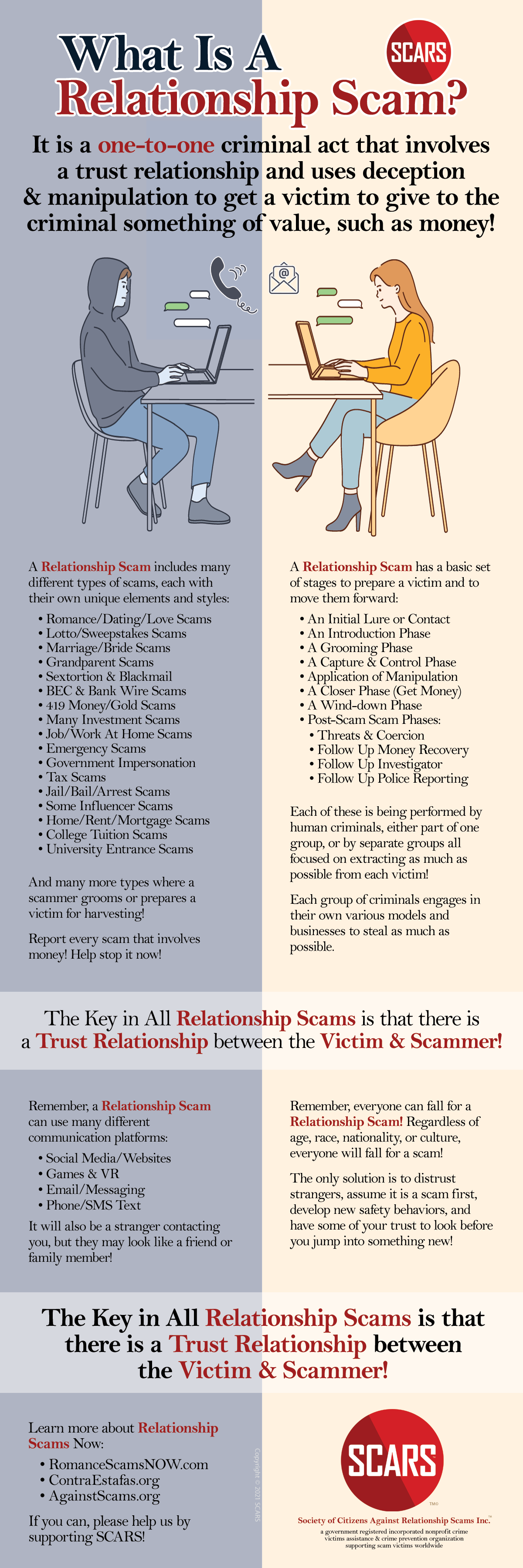What Is A Relationship Scam?
Understanding Scams Infographic!
A SCARS Insight
A Relationship Scam – Don’t You mean A Romance Scam?
Nope!
The Definition of a Relationship Scam:
It is a one-to-one criminal act that involves a trust relationship and uses deception & manipulation to get a victim to give to the criminal something of value, such as money!
A Relationship Scam includes many different types of scams, each with their own unique elements and styles:
- Romance/Dating/Love Scams
- Lotto/Sweepstakes Scams
- Marriage/Bride Scams
- Grandparent Scams
- Sextortion & Blackmail
- BEC (Business Email Compromise – phone/message/email) & Bank Wire Scams
- 419 Money/Gold Scams (Nigerian Prince Scams)
- Many Investment Scams
- Job/Work At Home Scams
- Emergency Scams
- Government Impersonation
- Tax/Social Security Scams
- Jail/Bail/Arrest Scams
- Some Influencer Scams
- Home/Rent/Mortgage Scams
- College Tuition Scams
- University Entrance Scams
And many more types where a scammer grooms or prepares a victim for harvesting!
A Relationship Scam has a basic set of stages to prepare a victim and to move them forward:
- An Initial Lure or Contact
- An Introduction Phase
- A Grooming Phase
- A Capture & Control Phase – Application of Manipulation
- A Closer Phase (Get Money)
- A Wind-down Phase
- Post-Scam Scam Phases:
- Threats & Coercion
- Follow Up Money Recovery Scams
- Follow Up Private Investigator Scams
- Follow Up Police Reporting Scams
Each of these is being performed by human criminals, either part of one group or by separate groups all focused on extracting as much as possible from each victim!
Each group of criminals engages in their own various models and businesses to steal as much as possible.
The Key in All Relationship Scams is that there is a Trust Relationship between the Victim & Scammer!
Remember, a Relationship Scam can use many different communication platforms:
- Social Media/Websites
- Games & VR
- Email/Messaging
- Phone/SMS Text
- And many others
It will also be a stranger contacting you, but they may look like a friend or family member!
Remember, everyone can fall for a Relationship Scam!
Regardless of age, race, nationality, or culture, everyone will fall for a scam! The only solution is to distrust strangers, assume it is a scam first, develop new safety behaviors, and have someone you trust to look before you jump into something new!


![What Is A Relationship Scam? [INFOGRAPHIC]](https://romancescamsnow.com/wp-content/uploads/2021/10/What-Is-A-Relationship-Scam.png)


Can I find a way to use someone Gmail address to see if she is scamming me
Do you mean to take over a gmail account? You understand that it is a crime, a felony to do that?